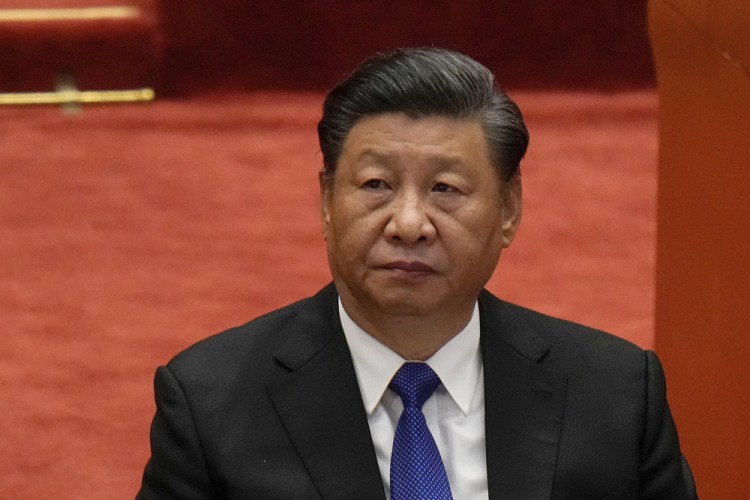A high-level meeting of the Chinese Communist Party on Thursday declared President Xi Jinping’s undisputed rule of “decisive significance” for its history, affirming Xi’s iron grip as he prepares for a near-inevitable third term that would extend his rule until at least 2027.
“Establishing comrade Xi Jinping’s position as the core of the Central Committee and the core of the whole party . . . was of decisive significance in advancing toward the great rejuvenation of the Chinese nation,”top officials said at the end of a four-day conclave, or “plenum,” in Beijing that passed a new ruling on party history.
The decision to write a resolution on the “major achievements and historical experience” of the party’s first 100 years makes Xi only the third leader after Mao Zedong and Deng Xiaoping to adjudicate on the past.
In official party lore, he now sits alongside the founding leader of the nation and the man often considered responsible for launching China’s economic reforms as an architect of his own epoch, or, as Xi calls it, a “new era” in the evolution of the party.
The closed-door plenary session of the Central Committee was Xi’s last significant opportunity to gather China’s most senior 370-odd officials before they meet again late next year for a leadership reshuffle where Xi is expected to further tighten his grip on power.
The Central Committee’s statement called that upcoming meeting “extremely important” because it would set an agenda for China through to the 100 year anniversary of the nation’s founding in 2049.
“The plenum is about past achievements but it’s really about the future,” said Tony Saich, director of the Ash Center for Democratic Governance and Innovation at Harvard University. “By tracing the continuity of the party over 100 years, it is used to show that it was inevitable for Xi to emerge at this time to be the ‘core’ of the party,” he said.
Unlike his immediate predecessors, Xi is widely expected to stay in office for a third five-year term, if not longer, after China’s rubber-stamp parliament scrapped presidential term limits in 2018, removing the only legal impediment to lifelong rule for Xi.
The new historical resolution, although lacking legal power to support Xi’s continued leadership, is a way for him to ensure acceptance within a party that has never fully formalized a mechanism for succession, relying instead on an intricate system of backroom horse-trading and internal consultation to pick leaders.
“Succession has always been a problem and Xi is mindful of that,” said Harvard’s Saich. “This resolution is geared to say that the party desperately wants Xi to stay on, will plead with him to stay on, because he is the leader to take China forward.”
Xi’s ambition to remain in charge of China for the foreseeable future became apparent as early as 2017, when he announced that China had entered a “new era” of its development and added his personal ideology to the party charter, essentially entwining himself with a new national agenda until at least 2035.
At the time, observers of Chinese politics debated whether Xi might follow the playbook of earlier leaders like Jiang Zemin or Deng by relinquishing some of his responsibilities while handing off certain duties to a loyal lieutenant.
But the conspicuous absence of an appointed successor has undermined such theories in favor of predictions that he will retain all three roles as head of the military, party, and state.
Meanwhile, in the last year, Xi has launched a volley of ambitious policy initiatives seeking to remake vast swaths of Chinese society. He has targeted environmental degradation, bubbles in the property market and “excessive” wealth held by entrepreneurs in the name of delivering “common prosperity.”
Xi often places himself front and center of these campaigns, many of which are carried out under the banner of his personal philosophy, known as “Xi Jinping thought for socialism with Chinese characteristics in a new era,” or “Xi Jinping Thought” for short.
Ahead of this week’s plenum, Chinese state media propaganda extolling Xi’s virtues went into overdrive. One hagiography described a young Xi reading Karl Marx’s “Das Kapital” three times, filling 18 notebooks with his thoughts. A string of tweets from the state-run Xinhua News Agency called him a “man of determination” and noted how he made time in his busy schedule for regular swims to “ensure that he has enough stamina to deal with affairs of the Party, government, and the military.”
In another sign of Xi’s elevated status, Thursday’s plenum readout called his ideology “Marxism for the 21st Century” that captures the “essence” of Chinese culture.
Xi’s approach to resolving issues of inequality is through a strong state that suppresses diversity of ideas in society in the name of strengthening China, said Kou Chien-Wen, a scholar of Chinese politics at the College of International Affairs at National Chengchi University in Taiwan.
Kou added that at stake for Xi is proving China’s authoritarian model can outperform multiparty democracies in tackling social ills. “It is fundamentally about his belief that ‘national rejuvenation’ requires equality and that requires control of the people,” he said.
– – –
The Washington Post’s Lyric Li in Seoul and Pei Lin Wu in Taipei, Taiwan, contributed to this report.
Send questions/comments to the editors.



Success. Please wait for the page to reload. If the page does not reload within 5 seconds, please refresh the page.
Enter your email and password to access comments.
Hi, to comment on stories you must . This profile is in addition to your subscription and website login.
Already have a commenting profile? .
Invalid username/password.
Please check your email to confirm and complete your registration.
Only subscribers are eligible to post comments. Please subscribe or login first for digital access. Here’s why.
Use the form below to reset your password. When you've submitted your account email, we will send an email with a reset code.